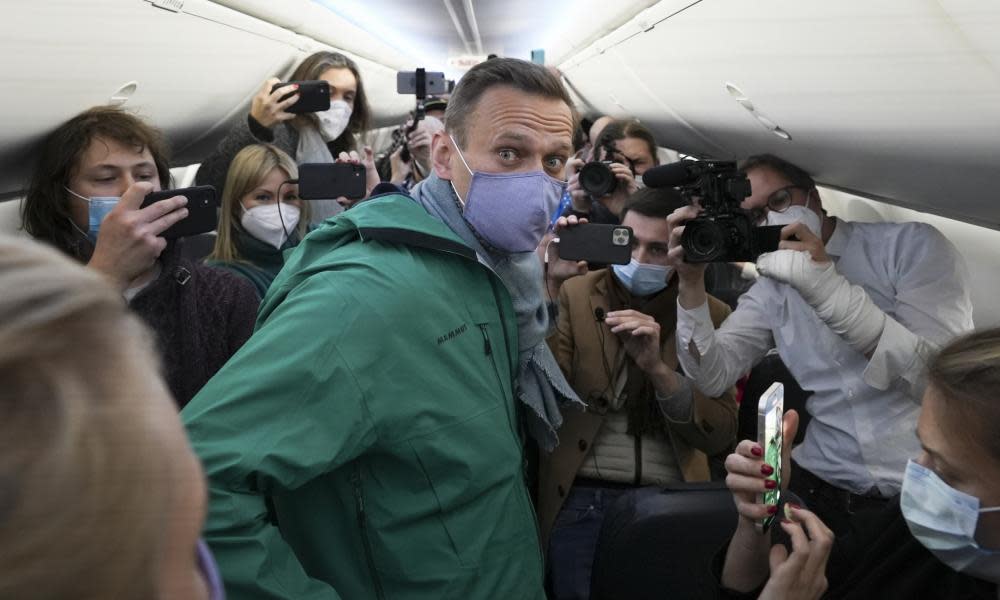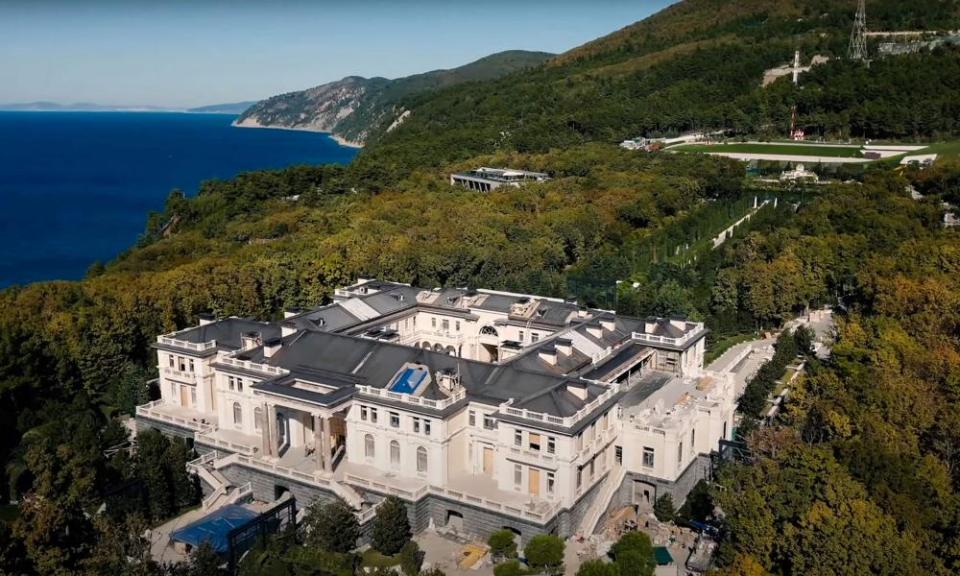EU foreign chief to fly to Moscow to condemn Navalny arrest

The EU’s foreign policy chief, Josep Borrell, will fly to Moscow to personally deliver the bloc’s condemnation of the “completely unacceptable” arrest of the opposition leader, Alexei Navalny.
The heads of state and government of the 27 member states will then reassess the EU’s relationship with Russia at a summit in March.
Borrell said there was no “concrete proposal” from the member states as yet as to the consequences of the continued detention of Navalny and 3,000 of his supporters but that the EU was “ready to react”.
Poland’s president, Andrzej Duda, is among those who have called for sanctions, including Italy, Romania, Lithuania, Latvia and Estonia. He had also asked for the EU official to cancel his planned visit to Moscow. But after a meeting of foreign ministers, the bloc’s high representative for foreign affairs said the trip in the first week of February to meet Russia’s foreign minister, Sergey Lavrov, would go ahead.
“I don’t share the opinion that when things go bad, you don’t talk,” Borrell said. “Quite the contrary, that’s the moment to talk.”
He added: “[On] the arrest of Navalny and the crackdown of supporters, the council considered it completely unacceptable, condemned the mass detentions, and the police brutality over the weekend, and we call on Russia for the release of Mr Navalny and those detained.”
The development came as Russia’s president, Vladimir Putin, denied that a lavish palace built on Russia’s Black Sea coast belonged to him, following a video exposé by Navalny made public following his arrest.

In a sign that the opposition figure’s investigation has touched a nerve with the Kremlin, Putin took the unusual step of claiming he had nothing to do with the property. It neither “belongs to or ever belonged to me or my close relatives. Ever,” Putin declared.
Putin dismissed the video, so far seen by more than 70 million people, as “boring”. He said he hadn’t had time to watch it and had merely glanced at a few clips compiled by his assistants. The montage of him swimming in a giant pool was “fake”, he said.
Putin’s denial is unlikely to convince the hundreds of thousands of Russians who took to the streets on Saturday, demanding Navalny’s release from custody. Navalny shot the video while recuperating in Germany from novichok poisoning, before his arrest a week ago when he flew back to Moscow.
Navalny claims the FSB spy agency was behind the bungled operation in Siberia last August – following a personal order to kill him by Russia’s president.
A student asked Putin today about the palace which was the subject of @navalny's film. Putin says he didn't have time to watch it "because of too much work" but that he can assure him that "none of this belongs to him or his relatives". pic.twitter.com/YGoFKXoDVb
— Christo Grozev (@christogrozev) January 25, 2021
The video investigation describes the palace near the southern resort town of Gelendzhik as “the most secret and guarded facility in Russia”.
“This is not a country house, not a dacha, not a residence. It has impregnable fences, its own port, its own guards, a church, its own access control, a no-fly zone and even its own border checkpoint,” Navalny alleges.
He adds: “It is directly a separate state within Russia. And in this state there is a single and irreplaceable king: Putin.”
Putin’s carefully worded comments about ownership do not contradict the investigation. According to Navalny, the residence formally belongs to four proxies. All have ties to Putin’s close friends and to official state security bodies, he suggests.
The palace’s actual ownership is revealed by the fact that the federal security service guards the building round the clock, he adds. There are other clues, including a ban on boats cruising past the property.
Critics of Putin joked on Twitter that the palace actually belonged to “Mikhail Ivanovich”, a codename used by those involved in the secret construction project to refer to the Russian president, in power for more than two decades. “Putin could not ignore what the whole country is discussing,” Lubov Sobol, a Navalny ally, tweeted.
The United States, Britain and EU countries had criticised Putin’s government on Sunday, with the French foreign minister, Jean-Yves Le Drian, describing the mass arrest of thousands of protesters in several Russia cities as “an intolerable affront” and a “slide towards authoritarianism”.
Clashes broke out in Moscow, St Petersburg, Vladivostok and other cities on Saturday and some protesters clashed with riot police in body armour and helmets. Dozens of people were injured.
Related: Alexei Navalny’s home makeover show exposes Vladimir Putin on every front | Rowan Moore
Manfred Weber, a senior German conservative and head of the centre-right EPP grouping in the EU parliament, told Germany’s RND newspaper group that the arrest of protesters should not be tolerated and that Russia should face financial sanctions.
“The EU foreign ministers are not allowed to dodge this once again and stop at general appeals,” he said. “The EU has to hit where it really hurts the Putin system – and that’s the money,” Weber said, adding that the bloc should cut financial transactions from Putin’s inner circle.
Related: From the archive: Killer, kleptocrat, genius, spy: the many myths of Vladimir Putin – podcast
In addition, a threat to stop the Nord Stream 2 pipeline, which is meant to double natural gas deliveries from Russia to Germany, must remain on the table, Weber added.
A German government spokesperson declined to comment when asked whether Berlin was willing to support new sanctions against Russia following Navalny’s arrest.
EU lawmakers passed a resolution on Thursday calling for the bloc to stop the completion of the Nord Stream 2 gas pipeline as a response to Navalny’s detention.
Germany’s chancellor, Angela Merkel, who has continued to back the project despite criticism elsewhere in the EU, said on Thursday her view of the project had not changed despite the Navalny case.
During the protests, a spokeswoman for the US embassy in Moscow, Rebecca Ros, said on Twitter that “the US supports the right of all people to peaceful protest, freedom of expression. Steps being taken by Russian authorities are suppressing those rights.” The embassy also tweeted a Department of State statement calling for Navalny’s release.
Putin’s spokesman, Dmitry Peskov, said comments by the US were “inappropriate” and he accused Washington of “interference in our internal affairs”.
The US ambassador to Russia, John Sullivan, was summoned on Monday for a conversation with Russia’s deputy foreign minister, Sergei Ryabkov. Ryabkov protested about the Biden administration’s support of Saturday’s demonstrations, which Moscow says were “illegal”.
The US was guilty of meddling in Russia’s internal affairs by allowing its tech companies to circulate pro-Navalny content, a foreign ministry spokesperson, Maria Zakharova, said.

 Yahoo Movies
Yahoo Movies 
